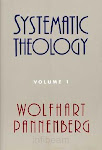A Babtist biblical scholar I met some time ago criticized systematic theology. “I’d rather be called a biblical theologian,” he said, “than a systematic theologian.” “We want to create systems,” he continued, “because we like to have a reason for everything.” Nonetheless, he said his faith “can handle tension.” I went away thinking about tension. What causes tension?
I can see three sources, or three kinds, of tension.
First, there are divine mysteries and paradoxes that can be said to cause tension. In short, a paradox is an apparent (not really a) contradiction; mystery begins where human understanding ends.
Second, there is tension that results from one’s faulty premises or presuppositions. For instance, say your faith embraces the beliefs/doctrines A and B — of which one or both are unsound. Together they bring about a problematic C which feels a bit unpleasant, but you embrace C anyways despite the tension.
In addition to these two kinds of tension, there is a third one. Let’s presume that A and B were, in fact, sound beliefs (biblically) or premises (logically). Together they bring about C which (for some reason) — you refuse to embrace. Because you are being intellectually dishonest (for whatever reason), you live with tension.
Now, which of these “tensions” was my biblical scholar friend talking about? Which of these can his faith “handle”?
The last kind of tension is not a very noble kind. I doubt he had that in mind. The second kind of tension is nobler: it takes some humility and courage to embrace C in the name of integrity. After all, you don’t know that A and B are unsound principles, and you may mistake the resulting tension from C as the type that accompanies mysteries and paradoxes. This brings us to the first kind: the only truly noble type. I think my friend was talking about the first kind of tension.
Now another question arises: what makes him think that the “systematic theologians” can’t handle tension of the first type? A brief look at the great systematic theologians of Church history ― Augustine, Boethius, Bonaventura, Aquinas, to name a few ― shows that they are high on divine mysteries and paradoxes. It’s the two other kind of tension they’d like to be free from. That’s why they want to remain “systematic” (lucid) in their thinking.
I really don’t like the juxtaposition of “biblical” versus “systematic” theology.
At least the tension-argument above is not very convincing. It’s misleading, it distorts the question, raises a straw-man, if not further elaborated on as I have tried to do here.







No comments:
Post a Comment